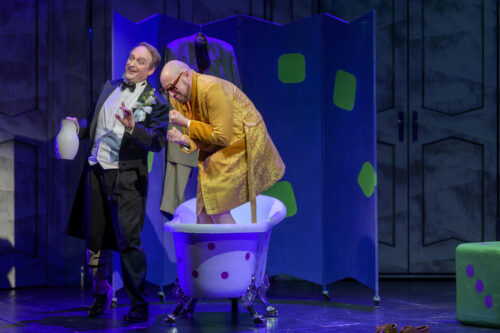 Czech Republic Nino Rota, The Florentine Straw Hat (Il cappello di paglia di Firenze): Soloists, Chorus, Ballet and Orchestra of the National Moravian-Silesian Theatre / Marek Šedivý (conductor). Estates Theatre, Prague, 14.4.2025. (GT)
Czech Republic Nino Rota, The Florentine Straw Hat (Il cappello di paglia di Firenze): Soloists, Chorus, Ballet and Orchestra of the National Moravian-Silesian Theatre / Marek Šedivý (conductor). Estates Theatre, Prague, 14.4.2025. (GT)

This opera had its Czech premiere on 13 March this year in Ostrava, and I was fortunate to see the third performance at the Antonín Dvořák Theatre (review here). I was impressed by both the singing and staging in Jiří Nekvasil’s production because it captures the ostentatiously comic conception of Nino Rota’s stage work and reveals the underlying social injustice of Italian society of the period.
Of course, Rota is most celebrated – not for his eleven operas or many chamber, choral or orchestral works, but for the film scores written for Italy’s finest moviemakers. These embrace a warmth of humanity in empathising for the characters, heightened with colourful orchestration. Rota’s contribution to Fellini’s La Strada, Nights of Cabiria, La Dolce Vita, Visconti’s The Leopard, and Coppola’s The Godfather Parts I and II significantly contributed to the success of these classic films among audiences which continues to this day.
If his film music was up-to-date and vivid, Rota’s score for this opera reflects on influences from diverse Italian and European composers; the opening overture invokes the genius of Mozart, while there emerge hints of Donizetti, Rossini, and Puccini throughout the two-hour farce. However, Rota’s skilful orchestration and vocal writing show he is a much under-rated composer, and one would like to hear more of his other stage works, there are ballets also in his repertoire. Rota’s operas have been regularly performed all over Italy, and this opera has been staged in the US, Wexford, Graz and other theatres in recent years.
The narrative is about the loss of a hat from fashionable Florence that is ruined by a hungry horse, thus interrupting the marriage of the two main characters – the wealthy and ambitious Fadinard and the poor, innocent Elena. A factor which emerges is the underlying issues of middle- and upper-class society in post-war Italy. The jealousy in the relationships between husband and wife, as well as suspicions and betrayal keep the narrative richly intriguing and become comic, with several tangents developed throughout the swiftly moving story. Greed, jealousy and secret lovers are all fashioned throughout the libretto and embellished in a mixture of slapstick comedy worthy of any Marx Brothers movie.
Of the singers, the two principal characters and the secondary ones were more at ease in their roles than just a month ago, and this allowed all the comic jokes and humour to emerge fully; a most notable scene was at the beginning of Act II when the wealthy Beaupertuis was taking his bath. His acting and singing were superbly in character. Every element of ridiculous comedy emerges when he complains about the tightly fitting shoes left by Nonancourt – Elena’s frustrated father – who has taken the more suitable (and expensive) shoes. Another concern for Beaupertuis is his missing wife Anaide, who is having an affair with the officer Emilio, and his wife has a replacement for the Florentine straw hat …at least that is what they think. A very striking scene in Act III depicts a sudden rainstorm in which both actors and singers are armed with umbrellas and desperately face off terrible winds against wonderfully evocative orchestral playing – as impressively realistic as anything composed by Beethoven or Wagner.

My first impression of this Prague performance was the outstanding acoustics of the Estate Theatre that gave both orchestra and singers great lucidity from which the entire show benefited. The orchestra sounded quite different from the show last month in Ostrava – every nuance of the strings, brass and woodwind was crystal clear – all under the vividly precise conducting of Marek Šedivý. A great advantage was the singing of the two leading roles of Fadinard and Elena. Martin Šrejma’s Fadinard revealed a beautifully vibrant tenor of nobility and nuance. The Elena of Veronica Rovná portrayed a wide range and vivid colour, easily reaching the highest notes in her three arias; the third in Act IV was magnificent with its high coloratura.
This performance in the Czech capital was part of the Sixteenth Annual Festival of Art Theatre in which professional theatres present their latest work; the Czech Republic boasts as many as seven professional opera and ballet companies in addition to the numerous drama theatres which produce outstanding work. The performance by the Ostrava company of this terrific comedy – from one of the most neglected composers of the twentieth century – was a triumph and fully deserved the tremendous reception from the enthusiastic Prague audience.
Gregor Tassie
Production:
Stage director – Jiří Nekvasil
Sets – David Bazika
Costumes – Zuzana Bambušek Krejzková
Choreography, Gagman – Števo Capko
Chorus master – Jurij Galatenko
Dramaturgy – Juraj Bajús
Cast:
Fadinard – Martin Šrejma
Nonancourt – Martin Gurbaľ
Beaupertuis – Jiří Hájek
Vezinet – Josef Moravec
Emilio – Daniel Kfelíř
Felice – Martin Javorský
Achille di Rosalba / A guardsman – Rudolf Medňanský
A corporal of the guard – Ihor Maryshkin
Elena – Veronika Rovná
Anaide – Miroslava Časarová
A milliner – Marcela Gurbaľová
La Baronessa di Champigny- Anna Nitrová
